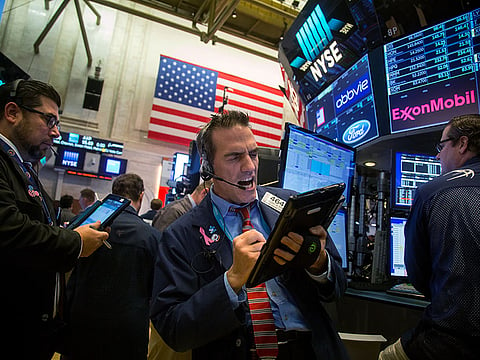Global markets: Investor angst to return, focus shifts to US markets
US stocks to set tone for bourses worldwide this week, after bond market flux returns

Dubai: US stocks will set the tone for bourses worldwide this week, after market volatility returned on the central bank letting inflation and the economy continue unabated while the job market recovers.
“The corporate side of the calendar is quite sparse this week, with US earnings season at an end and just some UK trading statements to provide interest aside from full-year numbers from Kingfisher,” noted Chris Beauchamp, chief market analyst at UK-based online trading platform IG.
“Global flash PMIs (purchase manufacturing indicators) help to make up for this, along with UK employment, CPI (consumer price inflation) and retail sales data.”
Investor worries return
Analysts evaluate investor angst returning to markets, with US Federal Reserve chairman Jerome Powell scheduled to testify twice in the week ahead and more than a dozen other Fed speeches expected.
Moreover, the bond market’s reaction to the central bank this past week was unusually volatile. The end of last week saw a big selloff in bonds and spiking rates after the market was initially steady after the two-day Fed meeting and Powell’s briefing on Wednesday.
“The steep sell-off on Thursday across commodities, stocks and bonds occurred after the dovish FOMC meeting failed to reassure the market on fears that yields and inflation will continue to rise,” noted Saxo Bank’s head of commodity strategy Ole Hansen.
Bond market nervous
The US central bank will target an average range of inflation around 2 per cent, so that number could exceed that threshold for some time. Analysts view that the shift in stance has made the bond market nervous. The Fed normally hikes interest rates if inflation flared up to avoid an overheating economy.
“The Fed will basically allow both the economy and inflation to run as hot as they want to. In particular, the inflation comment about allowing it to run above 2 per cent for a sustained period spooked the market.”
In the US, stocks were overall lower on the week, with the Dow off about 0.5 per cent and the S&P 500, down 0.7 per cent. The Nasdaq Composite was off 0.8 per cent for the week.
Risk appetite reduces
Analysts add that it is the ongoing surge in US bond yields that have forced a reduction in the general level of risk appetite across markets. Bond yields, which move inversely to price, rose amid the selling seen in stock markets late last week.
The benchmark 10-year US Treasury yield, which impacts mortgages and other loans, have driven market moves broadly in recent weeks and hovered near 14-month highs. It rose as high as 1.7 per cent on Thursday and Friday last week, a move of more than 10 basis points in less than a day.
The US Federal Reserve took no action at its two-day meeting last week, but it did present new economic projections. The central bank said it expects higher economic growth and inflation in the US this year, although it repeated its pledge to keep its target interest rate near zero.
The majority of Fed officials did not see any interest rate hikes through 2023. Powell also reiterated that the Fed sees just a temporary pickup in inflation this year because of the base effects against last year’s numbers when prices fell.
Global stocks ease
Stocks globally eased as investors sought the next reasons to add risk following the passing of President Joe Biden’s $1.9 trillion stimulus plan, broadening COVID-19 vaccinations and encouraging economic news.
Analysts also note that markets, having had a strong period of news-flow and positive catalysts off late, are now a little bit more susceptible to negative news causing big drawdowns.
The pan-European STOXX 600 index lost 0.87 per cent and MSCI’s gauge of stocks across the globe shed 0.33 per cent.
Sign up for the Daily Briefing
Get the latest news and updates straight to your inbox








